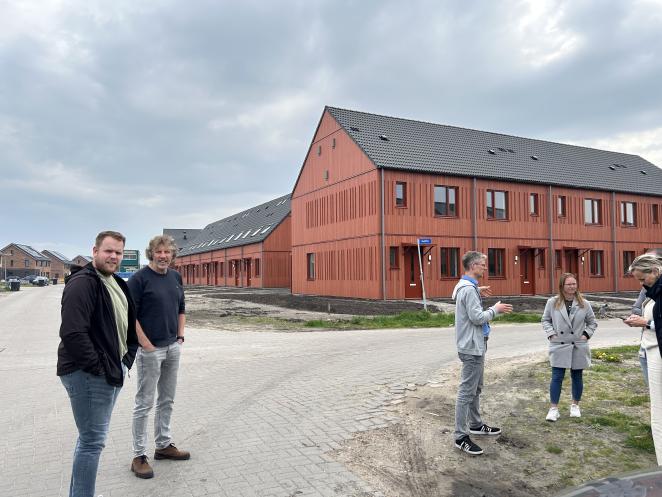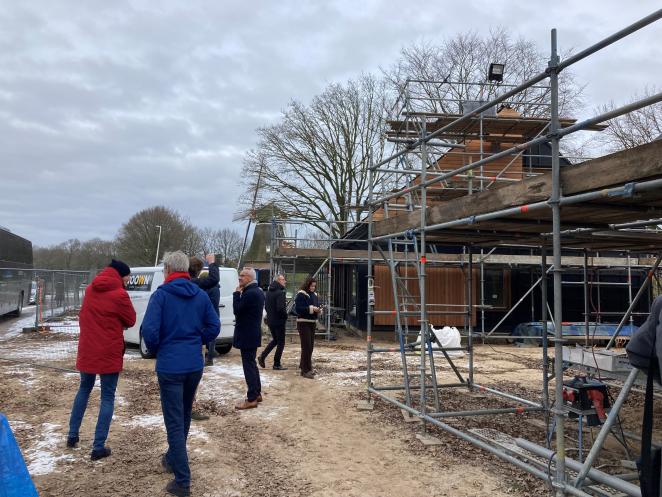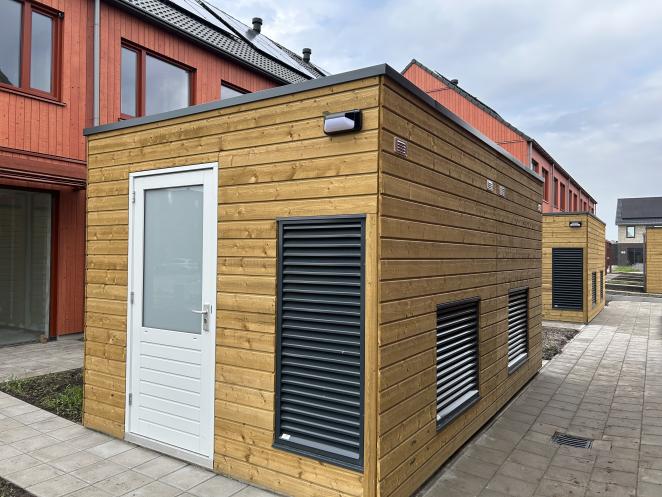On 23rd April, during a CTB regional meeting hosted by Actium, the Dutch partners took a closer look at the ‘Drenthe Woont Circulair’ homes in the Kloosterakker neighbourhood in Assen.

Housing corporation with circular ambitions
CTB partner Actium is an ambitious housing corporation located in the green heart of the Northern Netherlands, providing 16,000 households in Drenthe with an affordable home.
Together with tenants and other stakeholders, the organization endeavours to incorporate circular and sustainable practices by focusing on energy efficiency, renewable energy and increasing circularity, including the use of building materials.

Projects & materials
During our tour of the new ‘circular’ neighbourhood Kloosterakker, Marcel Westerveen explained some of the innovations that were explored during the construction as well as the challenges for building sustainably for the social housing sector.
Actium has built a block of 32 houses, 16of which are timber-frame family homes built on a foundation created with CO₂-reduced and geo-polymer concrete. The facade of these houses is covered in a cladding ofFinti wood, a durable softwood alternative.
Actium has built a block of 32 houses - designed to be as passive as possible by choosing, for instance, biobased insulation in combination with passive sunscreens, the positioning of windows and the so-called 'solar chimney' all benefitting indoor thermal regulation in winter and summer.

Experimentation & innovation
Sixteen houses are timber-frame family homes built on a foundation created with CO₂-reduced and geo-polymer concrete. The facade of these houses is covered in a cladding of Finti wood, a durable softwood alternative.
In the other 16 houses, the facades have been created with Drystack demountable, mortar-free brick – a real innovation in building. “We applied a different variation – the ‘ClickBrick by Wienerberger’ - in another apartment building in Assen,” Marcel told the group.
Actium has experimented with other sustainability approaches, such as biobased building in Diever, for example.

Bio-based building
Actium has realized six attractive senior homes in Diever, where the emphasis was on bio-based materials and circular construction, using Cross-Laminated Timber (CLT) instead of timber-frame panels, reclaimed materials such as roof tiles and solar panels repurposed from own demolition stock.
During the CTB kick-off meeting in Drenthe, the partners visited the construction site and witnessed the housing corporation's approach. Bio-based also fits perfectly with the project's ambitions for future-proof building practices.

Costs, choices, compromises
Back to the pilot projects in Assen, the group heard that being social and green is not easy. Marcel continued: “ While these houses demonstrate great promise, each DWC home costs, on average, about 10% more compared to conventional construction.”
This premium is a result of:
- Extra R&D into new materials and methods
- Certification, fire-safety testing (added time and expense)
Consequently, deliberate compromises had to be made to keep the costs down, which meant occasionally selecting a ‘best available’ rather than the absolute greenest option, while also managing the inherent risks of an unproven supply chain. However equally important criteria for material choice included low maintenance without compromising living comfort.
Every success—and every setback—sharpens the collective expertise. By taking measured, responsible steps, we’re steadily advancing toward scalable, cost-effective, and truly circular housing solutions.
